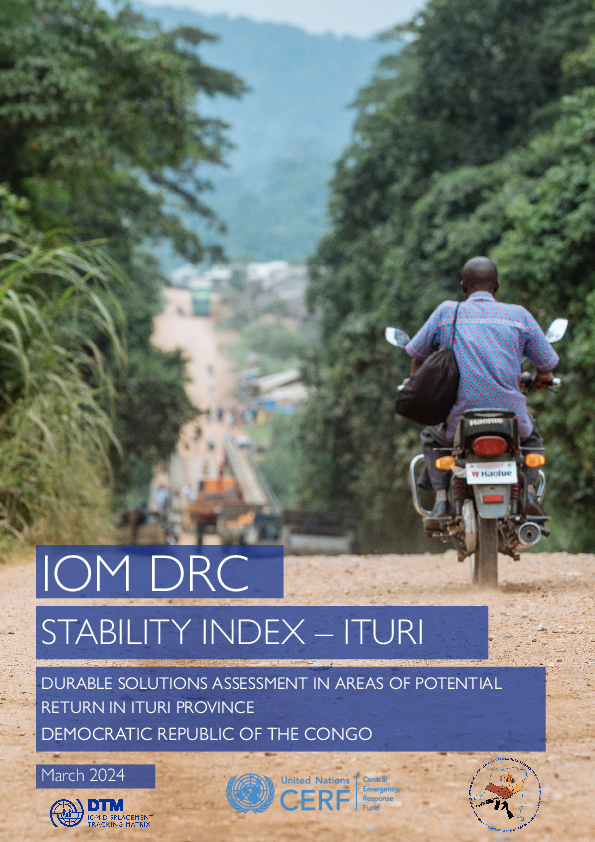-
Countries
-
Data and Analysis
-
Special Focus
-
Crisis Responses
DRC – Stability Index - Ituri (March 2024)

Contact
DTM DRC, iomdrcdtm@iom.int
Language
English
Location
Democratic Republic of the Congo
Period Covered
Oct 28 2023
Nov 08 2023
Activity
- Survey
The province of Ituri is home to the second largest IDP and returnee population of any province in the DRC (1.6 million and 1.2 million individuals respectively) and has been in the focus of recent efforts to strengthen durable solutions programming in the DRC. The province has been plagued by long-term instability and conflict between government forces, armed groups such as ADF, CODECO1, Zaire and others. United Nations monitoring groups have recorded increased levels of violence, particularly around mining and IDP sites in the province, hindering humanitarian efforts. Recently the focus of the humanitarian community in the province has shifted towards preparation for increased durable solutions programming in light of increased returns of internally displaced persons and the protracted nature of the ongoing crisis.
It is in this context that the International Organization for Migration (IOM), through the Displacement Tracking Matrix (DTM), has chosen to implement the Stability Index (SI) for the first time in the DRC with the aim of identifying “pockets of stability” for targeted durable solutions programming, as well as hotspots of relative instability, with a concentration of poor and unstable living conditions, more suitable to receive humanitarian assistance. In Ituri, DTM implemented the SI in Irumu, Mahagi, and Djugu, and Bunia, which together host 89 per cent of all returnees in the province. The SI assesses the relative stability of a location by evaluating three key domains: 1) Livelihoods and access to basic services, 2) Safety and Security and 3) Social cohesion, as well as information pertaining to the occurrence and impact of natural disasters, analysed separately. The SI is part of the DTM’s global Solutions and Mobility Toolkit and has been deployed successfully in diverse contexts such as Burundi, the countries of the Lake Chad basin, Ghana, and Mali.
A total of 1,249 Villages in the territories of Djugu (426 villages), Irumu (277), Mahagi (335), and the health zone of Bunia (211) were selected for inclusion in the analysis using simple random sampling from the DTM DRC village master list, updated during the bi-annual Mobility Tracking exercise.
Locations of relative stability/instability are often found in close proximity, with pockets of stability found in broadly unstable areas and vice versa. Djugu recorded Stability Index of 63, with sub-indices highlighting challenges in Access to Basic Services (32), Security (65), and Social Cohesion (59). Irumu exhibited a higher overall Stability Index of 72, and average scores in Access to Basic Services (41), Security (65), and Social Cohesion (67).
